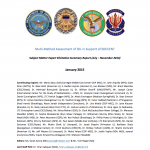Subject Matter Expert (SME) Assessment of ISIL

Multi-Method Assessment of ISIL in Support of SOCCENT: Subject Matter Expert Elicitation Summary Report, July – November 2014.
Author | Editor: Canna, S. & Rieger, T. (NSI, Inc).
From July through November 2014, NSI conducted a Subject Matter Expert (SME) Elicitation study to gather insights from interviews, panel discussions, seminars, and personal communications with over 50 SMEs from the United States, the Middle East, and Europe. The interview questionnaire and transcripts from the SME elicitation effort are available upon request. CTTSO provided the Apptek Talk2Me platform to expedite the transcription of the SME Elicitation interviews. In addition, all of the data (human edited and original audio) are posted on the Web-based Talk2Me platform for the SMA study for further analytics and reporting.
This report summarizes SME findings that help us understand ISIL’s intangible appeal. However, it does not attempt to adjudicate or force convergence of the findings.
Conditions: The Perfect Storm
Some SMEs described conditions on the ground as a “perfect storm” for the emergence of ISIL. The confluence of the conditions listed below allowed ISIL to rise rapidly.
- Failed states of Iraq and Syria: The power vacuum in the Sunni regions of Iraq and Syria opened the door for an alternative governing force to coalesce and gain the acquiescence and/or support of the civilian 3 population.
- Sunni grievances: The combination of political exclusion of Sunnis from government in Iraq and Syria along with the abuses visited upon Syrian Sunnis by the Assad regime have fed narratives of Sunni grievance, victimization, and marginalization.
- Arab world undergoing rapid change: ISIL is an expression of rising Islamist fundamentalism, declining sense of state-based nationalism, and a sense of empowerment spurred by the Arab Spring.
- Information Age: The advent of the information age makes it easier for people to communicate across large distances, to create a platform for sharing experiences and beliefs with like-minded individuals, and to actively persuade others to sympathize with or join a cause.
- Youth bulge: Like many parts of the developing world, Syria and Iraq are experiencing a youth bulge that, when combined with unemployment and lack of political voice, has resulted in a reservoir of young, angry men.
On the whole, SMEs felt that these conditions made it possible for ISIL to seize the opportunity to push for an alternative form of governance in the region. However, while these conditions were extremely important, ISIL’s sustainability and longevity is also based on its capacity to control the population and to garner sympathy and support from the broader Sunni Muslim population both inside and outside the region.
Capacity to Control
SMEs believed that ISIL’s capacity to control is based on several factors.
- Fear and coercion: ISIL has a monopoly over the use of force in areas it “governs.” It uses the implicit and explicit threat of violence against civilians to ensure acquiescence.
- Provision of better governance and order: Some argue that ISIL provides better governance and essential services than what was experienced under Iraqi and Syrian rule. Furthermore, ISIL provides some degree of stability and order in a previously uncertain environment.
- Lack of a viable alternative: There are currently no alternative forms of Sunni-empowered governance available. ISIL draws on the power of collective Sunni identity and Sunni grievances to establish its legitimacy.
- Strong leadership: ISIL has a strong, agile, pragmatic leadership and organizational structure. It has a highly motivated and a dedicated rank and file under the leadership of a disciplined and experienced cadre, supported by consistent and compelling messaging.
- Success breeds success: ISIL’s momentum and its ability to survive coalition attacks to date plays a role in convincing civilians and local power brokers that it will be around for the long-term, which reinforces support or acquiescence to ISIL, and in turn further reinforces ISIL’s capacity to control.
ISIL’s capacity to control is largely based on its interactions with the local population. However, ISIL also enjoys sympathy, support, and recruits from the global Sunni Muslim population. SMEs interviewed felt that the primary way ISIL achieves support from the global Sunni Muslim population is through persuasive use of narrative. SMEs identified over 20 narratives ISIL uses to persuade, the most powerful of which are described below.
Persuasive Narratives
Narratives are messages that represent the ideals, beliefs, and social constructs of a group. ISIL uses them within the civilian population to consolidate control and amongst the global Sunni Muslim population to garner sympathy, support, and recruits.
- Moral imperative: ISIL uses a variety of narratives to convey the idea that Muslims have a moral imperative to support them. These narratives include the restitution of the caliphate, creation of a utopian society based on Muslim laws and values, ISIL as a representative of the pure form of Islam, ISIL bringing back the Golden Age of Islam, al Baghdadi as a direct descendent of the Prophet, and that ISIL’s caliphate will unite all Sunni Muslims.
- Sunni grievances and victimhood: ISIL uses shared feelings of marginalization, repression, and lack of power to gain legitimacy and support. They draw on sub-narratives of victimization among Sunnis at the hands of Shias and the West to cement this powerful narrative.
- Immediacy: ISIL rejects al Qaeda’s core narrative that it needed to wait for the right time to establish a caliphate. ISIL claims that they did it within months. ISIL touts its willingness to take action, combined with its success in establishing what it calls a caliphate, as evidence of their proclaimed righteousness and destiny.
- Reinvention of self: No matter what kind of life you led, when you convert to Islam and join the fight, all previous wrongdoing is washed away. ISIL offers a new start and a new sense of identity and purpose to anyone who joins them.
- Thrills, adventures, and heroism: Some individuals are particularly drawn to ISIL because it advertises thrills, adventures, and opportunities for heroism (and violence) that appeal to some young men’s sense of masculinity.
Schools of Thought
While these factors represent areas of qualified agreement on key factors explaining ISIL support, SMEs differed on which factors were the most important, which led to two primary schools of thought regarding ISIL’s longevity.
- The first school of thought is ISIL has resilient properties via its capacity to control people and territory stemming from pragmatic leadership and organization, intimidation tactics, tapping into existing Sunni grievances and use of a well-developed narrative and media outreach to attract and motivate fighters.
- The second school of thought is ISIL is not a durable organization. It has taken advantage of a pre-existing sectarian conflict to acquire land, wealth, and power. It only attracts a narrow band of disaffected Sunni youth, is alienating local populations by over-the-top violence and harsh implementation of Sharia, is unable to expand into territories controlled by functioning states, and does not possess the expertise required to form a bureaucracy and effectively govern.
In reviewing the effort, a third school of thought emerged: that the real challenge is not ISIL as an organization, but rather the sense of disempowerment, anger, and frustration in the Muslim world. This condition is evidenced by rising Islamist fundamentalism found within Sunni Muslim populations around the world combined with a declining sense of state-based nationalism. It is fueled by a perception of inequality and thwarted aspirations in addition to the conditions mentioned earlier in this chapter: failed states, demographic shifts, unemployment, drought, spread of communication technologies, marginalization, etc. If the problem is larger than ISIL, then solutions that only seek to undermine ISIL’s capacity to control are insufficient to address the underlying cause of conflict, as they address only the symptoms of the problem and not the underlying root cause.
Additional Factors
This summary presents a cursory review of the many topics addressed by over 50 SMEs interviewed for this effort. In addition, the report also touches on a number of other controversial topics. These include:
- whether ISIL is primarily ideological or opportunistic;
- whether the local elite power base in Iraq and Syria sincerely supports ISIL;
- situational factors contributing to the sustainment of ISIL;
- the degree to which regional Sunni Muslim states support or oppose ISIL; and
- a brief look at whether the rise of other historical violent social movements could be instructive.
SME elicitation through the SMA SOCCENT Speaker Series will continue. To be added to the distribution list for the series, please contact Mr. Sam Rhem at samuel.d.rhem.ctr@mail.mil.

Comments